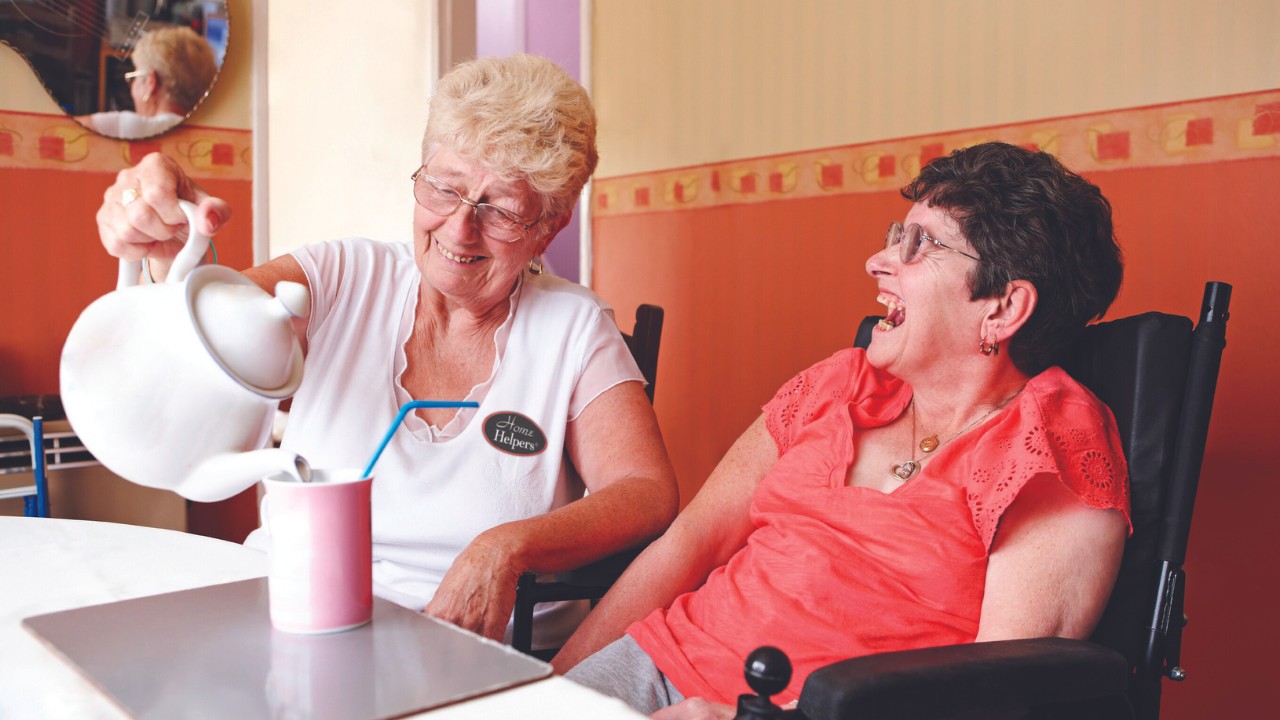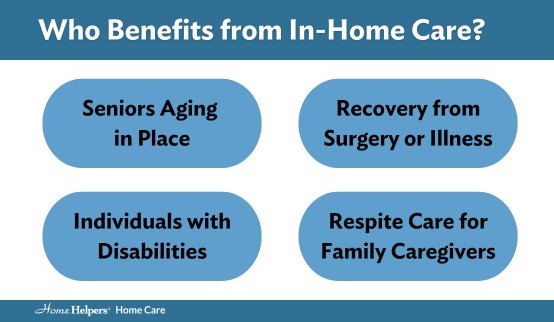Guide to In-Home Care: Benefits and Services Explained

Author: Jonathan Marsh
In-home care offers a valuable way for seniors and people with disabilities to stay in their homes while getting the support they need. As more people want to stay independent, it is crucial to understand in-home care. Knowing what it involves, its benefits, and the services available can help.
This guide will help you find the key information you need to make smart choices about in-home care for yourself or your loved ones.
What is In-Home Care?
In-home care refers to non-medical services provided to individuals in the comfort of their own homes. In-home care focuses on daily living activities and companionship. Home health care, on the other hand, involves medical assistance like nursing or physical therapy.
In-home care services meet the specific needs of seniors and those with disabilities. This allows them to stay in their familiar environment.
Non-Medical In-Home Care vs. Home Health Care
Non-medical in-home care offers various services, including personal care like bathing and dressing. It also covers light housekeeping, meal preparation, and companionship. Home health care, on the other hand, includes services provided by medical professionals. These services can involve medical care, wound care, administering medications, or physical therapy.
When families choose non-medical in-home care, their loved ones receive the necessary daily support. This option allows them to avoid the clinical environment of a hospital or nursing home.
Who Benefits from In-Home Care?
In-home care is an excellent option for various groups of people:
- Seniors Aging in Place: Many seniors prefer to remain in their homes as they age. In-home care enables them to maintain their safety and comfort.
- Individuals with Disabilities: Those with physical or cognitive disabilities often require assistance with daily tasks. In-home care provides the support they need while maintaining their independence.
- Recovery from Surgery or Illness: Individuals may need help as they recover after a hospital stay. In-home care provides a smooth transition from hospital to home.
- Respite Care for Family Caregivers: Family caregivers can take a break with respite care, knowing their loved one is well cared for.

Types of In-Home Care Services
In-home care services can vary depending on the needs of the individual. Here are some common types:
Personal Care Services
Personal care services are crucial for helping individuals manage daily activities that may become difficult with age or disability. These services allow individuals to keep their independence and dignity. They ensure they get the support needed for activities of daily living (ADLs), such as:
- Bathing and dressing
- Grooming and hygiene
- Mobility assistance
- Toileting and incontinence care
Companionship Services
Companionship services are essential for promoting emotional well-being by offering social interaction and support to individuals who may feel isolated. These services enhance quality of life by providing regular engagement and meaningful connections. This includes:
- Engaging in conversations and activities
- Accompanying on walks or outings
- Preventing feelings of loneliness and isolation
Homemaker Services
Homemaker services help ensure homes are safe and comfortable by maintaining cleanliness and organization. These services allow individuals to focus on their well-being while their household tasks are efficiently managed:
- Light housekeeping (e.g., dusting, vacuuming)
- Meal planning and preparation
- Grocery shopping and running errands
- Laundry and linen changes
Specialized Care Services
Specialized care services address those with chronic conditions or advanced illnesses' unique needs. These services ensure that individuals receive the appropriate level of care tailored to their specific health challenges.
- Dementia and Alzheimer's Care: Providing structured routines and cognitive engagement to support memory and daily function.
- End-of-life Care: Offering comfort and support during the final stages of life, focusing on quality of life and dignity.
- Post-operative Care: Assisting with recovery and rehabilitation at home, helping individuals regain strength and independence.
- Respite Care Services: Giving family caregivers temporary relief while ensuring their loved ones continue to receive quality care.
- Support for Stroke Recovery: Providing specialized care to help individuals regain mobility, speech, and daily functioning after a stroke.
Benefits of In-Home Care
In-home care provides a range of advantages that contribute to the overall well-being of individuals. Caring for someone in their own home guarantees that their unique needs receive personalized attention. This type of care enhances both physical and emotional health, making it a preferred choice for many families.
Independence and Dignity
In-home care, an essential component of senior care, offers more than just basic assistance. It helps people stay independent while living comfortably in their own homes. This approach supports a sense of autonomy, which is crucial for emotional well-being.
It respects their dignity by giving one-on-one care tailored to their needs. This ensures they receive compassionate and respectful support.
Comfort and Familiarity
Being at home brings comfort and familiarity, which can boost mental and emotional well-being. The home, with its personal items and cherished memories, gives a unique sense of security and stability. This environment often provides the best care, helping individuals feel more comfortable and involved in their daily lives.
Personalized Care
In-home care is personalized to fit each person’s unique needs and routines. This ensures the services provided align closely with their preferences. This level of customization allows caregivers and the care team to change the care plan as the person’s needs change. This ensures they continue to receive personalized support.
The result is a more effective and satisfying care experience that honors the individual's unique circumstances.
Cost-Effective
In many cases, in-home care costs less than moving to a nursing home or assisted living facility. It offers the necessary support tailored to the individual's needs, avoiding the additional expenses associated with residential care. Family members can control costs by choosing only the services they need. This makes in-home care an affordable option that still maintains quality.

Choosing the Right In-Home Care Provider
Selecting the right in-home care provider is crucial to ensuring quality care. Here are some key considerations:
Qualifications and Experience
Ensure the caregivers are qualified and experienced in providing the necessary care. Look for certifications and training relevant to the services you need.
Reputation and Reviews
Check the home health agencies' reputation through online reviews and testimonials. Positive feedback from other families can give you confidence in your choice.
Service Flexibility
Choose an agency that offers flexible services that can be adjusted as needs change. This adaptability is essential as the level of care required may evolve over time.
How to Get Started with In-Home Care
Starting in-home care is a straightforward process. It begins with understanding the person’s unique needs to create a customized care plan. The goal is to provide tailored support while fostering a trusting relationship that ensures long-term well-being.
Initial Consultation
The process begins with a free consultation to assess the needs of the individual. This consultation helps to understand the level of care required and allows the creation of a personalized care plan.
Creating a Care Plan
Based on the consultation, a detailed care plan is developed, outlining the specific services to be provided. This plan is tailored to meet the unique needs of the individual.
Ongoing Communication
Regular communication with the family is maintained to ensure the care plan remains effective. This ongoing dialogue helps make adjustments when needed. It ensures the care provided matches the person’s changing needs.
How Home Helpers Home Care of Bradenton Can Help
Home Helpers Home Care of Bradenton is a trusted provider of non-medical in-home care services. We are committed to providing exceptional in-home care services. We offer personalized care plans tailored to meet the unique needs of each client. Our skilled home health aides provide exceptional care, making sure your loved ones are always comfortable and well-supported.
We offer a variety of services, from personal care and companionship to specialized care. This includes support for dementia, respite, veterans, and many other needs. Our goal is to provide the support your loved ones need to live independently and comfortably at home.
Contact Us Today
To learn more about how we can help, visit our website or call us. You can reach us directly at (941) 499-5946 to schedule a free consultation. Let Home Helpers Home Care of Bradenton be your trusted partner in caring for your loved ones.
Conclusion
In-home care is a valuable service that keeps individuals independent. It provides the support they need while they remain in the comfort of their own homes. Understanding the benefits and options available can help families make informed decisions about care.
If you’re considering in-home care for yourself or a loved one, contact Home Helpers Home Care of Bradenton today. We’re here to help you every step of the way.
